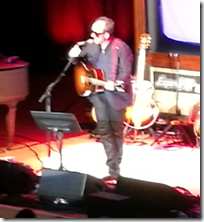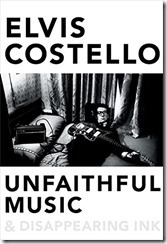I was fortunate to get a late ticket to this mainly solo Elvis Costello concert, on the campus of Warwick University near Coventry.
Why Warwick? Costello remarked that he had played there before in the early 70s, at the Student Union, under the name Rusty (probably a duo with Alan Mayes).
I have seen Costello perform on a few occasions but not for several years. I was re-enthused after reading his book, Unfaithful Music and Disappearing Ink, which I loved. (If you follow the Amazon link above you will find my review, or you can read it on this blog).
What follows are a few jumbled impressions the morning after.
The venue is delightful, small enough that everyone gets a good view, though the sound was not great from where we were sitting; it was a bit echoey making the lyrics indistinct at times, though it improved as the evening went on (or I might have adjusted to it).
There was a short opening act from Larkin Poe – two sisters from Atlanta, Georgia, Rebecca and Megan Lovell, with guitars and harmonies. I enjoyed the set, though they said they found the audience a bit too British and restrained.
After a short break Costello came on. Apologies for blurry picture! He was wearing a suit with an open neck and looked his age, but in a good way: affable, not pretending it was forty years ago, slightly hunched a lot of the time, but in very good voice as he kicked off with a fast and powerful rendition of Lipstick Vogue.
He talked a lot between songs and sounds just like his book – even to the extent that I wondered if the book had been dictated. I actually enjoyed his patter as much as the songs, but then I loved the book too: stories from the road, reflections on his father and later his grandfather, sharp remarks about politics and our failure to learn the lessons of history. There are reasons for his anti-war stance.
There was a lot of talk; but a lot of songs too. I’ve copied the set list below, and there were 30 songs, with plenty of hits and plenty of less usual numbers as well. Had I been nearer the front I might have shouted for Indoor Fireworks; but I think most fans will have heard what they wanted to hear.
The set was dominated by a huge “television” on which we saw video to accompany the songs, a trick which worked pretty well. I’m pretty sure we also saw Costello’s father Ross MacManus performing, as well as some stills of his grandfather Pat MacManus.
Some of the highlights for me were Shipbuilding, performed from the piano; an energetic Watching the Detectives and an impassioned She.
After 17 songs we thought the concert was nearly over but not so. The first encore was six songs with Larkin Poe, including Pads Paws and Claws, Clown Strike, and a song called Burn the paper down to ash sung by Rebecca Lovell which I think is about the perils of tobacco.
After that we again thought it was all over, but no, Costello returned in his TV and sang Alison followed by Pump it Up.
Then it was back to the piano for Side by Side and I Can’t Stand up for Falling Down, followed by a reminiscence about his granddad, injured in the first world war by someone who did not know him, said Costello, and later reduced to busking in the economic depression of the 1930s.
By this time there really seemed to be some rapport with the crowd and I got the impression that Costello enjoyed the atmosphere.
An emotional Good year for the Roses followed by (What’s so funny ‘bout) Peace Love and Understanding, and it really was over.
I am a fan of course but this was a great concert for me. Costello is to my mind one of the great songwriters as well as being an unashamed entertainer. Last night we got a wonderfully varied performance with everything from journeys back to the punk era (Pump it Up) to the more reflective songs of a man looking back on a long career of watching the world.
Set list:
Lipstick Vogue
I Can’t Turn It Off
Mystery Dance
Accidents Will Happen
Ascension Day
Church Underground
45
Oliver’s Army
Shipbuilding – on piano
A Face In The Crowd – on piano
Walkin’ My Baby Back Home
Ghost Train
She
The Woman Makes The Man
Watching The Detectives
It’s Not My Time To Go
You’re Wondering Now
Encore 1
Pads, Paws And Claws – with Larkin Poe
Love Field – with Larkin Poe
Clown Strike – with Larkin Poe
Burn The Paper Down To Ash – with Larkin Poe, sung by Rebecca Lovell
Vitajex – with Larkin Poe, EC on ukulele
That’s Not The Part Of Him You’re Leaving – with Larkin Poe
Encore 2
Alison – inside the TV
Pump It Up – inside the TV
Side By Side – on piano
I Can’t Stand Up For Falling Down – on piano
Jimmie Standing In The Rain – including Brother, Can You Spare A Dime?
Good Year For The Roses
(What’s So Funny ‘Bout) Peace, Love And Understanding? – with Larkin Poe



